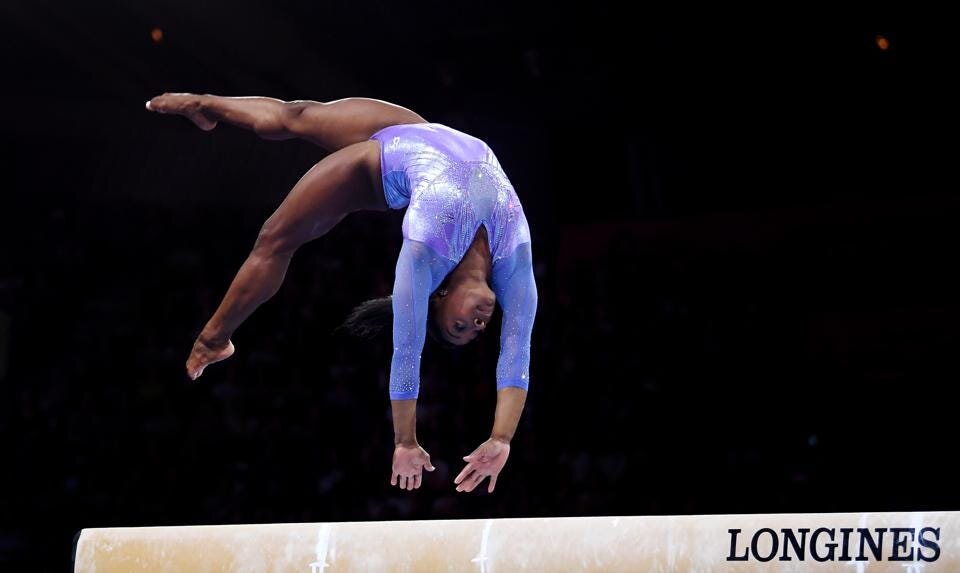By Katya Mavrelli,
The 2020 Tokyo Olympics are many things, but one thing they are for sure: they are different than any other Olympic Games. Not only because of the presence of new sports, such as surfing and skateboarding, but also because athletes have turned from mere participants into active members of an entire institution. And Simone Biles was the match that set the entire thing alight.
With a total of 31 Olympic and World Championship medals, the 24-year-old Simone Biles decidedly holds the title of the most decorated and successful young gymnast of our decade. Making her debut as the 2013 American Cup silver medalist, Biles often dominates the headlines not only for her well-exercised routines but also for her all-around inspiring performance on the floor. Known as ‘the Goat’, Biles has become one of the most known athletes of her time, becoming a favorite athlete for many, and an inspiration to many others.
That is why when she decided to withdraw from the all-around gymnastics competition in the Tokyo Olympics the world was shocked, to say the least. After withdrawing from the team final and then from the individual final competition, Biles announced that she consciously decided to put her mental health first and refrain from competing in order not to risk both her own safety and the performance of her teammates. And instead of coming face to face with international backlash, Biles was embraced by everyone, including coaches, fellow athletes, and ordinary people.
But why is this incident the element that differentiates the Tokyo Olympics from any other large-scale sports event?
For the first time, everyone grasped the full immensity of the pressure athletes is under. Watching them perform and understanding their effort to secure a place at the podium are two different things. They are the superhumans we all aspire to resemble and the people we all look up to, which shows just how much stress they carry on their shoulders. Representing, not only their sport but also their country, their race, and their gender, means their stress is constant and their pressure non-disappearing.
Biles’s stance sets her apart from other athletes and places her right in the epicenter of developments. Just like Naomi Osaka did, she decisively took control of her career and protected her safety. Instead of participating just for the sake of it, she took a step back and re-evaluated her decisions. She showcased the fact that athletes are humans, with their highs and their lows, who have been repeatedly denied the ability to protect and stand up for themselves.

And, at the end of the day, what do we admire about these superhumans? What makes us look into their eyes and marvel at their strength, their character, and their determination?
We admire their resilience. We admire the fact that, even when they are worn out when they are tired beyond words when they cannot even think of anything else, they rise and they carry us with them, making us, the spectators or fellow athletes in their sport, feel their joy and their pride. We admire their willingness to embrace and to teach, to welcome, and to celebrate.
This is exactly why we need to recognize that, for those, who give so much of themselves, who strive restlessly for the best every single day, mental strength comes before physical strength. Their stamina is admirable and their courage to become representatives of their sport is incredible.
Over time, the definition of ‘strength’ adapts to the different circumstances. Once upon a time, it was entirely correlated with the physical ability to perform admirable acts. Nowadays, however, the strength of the human mind combined with the strength of the body is what most consider to be the true and pure meaning of strength. And those who mock the importance of the mental aspect of it, simply cannot grasp the immensity of the implications if this is not balanced.
Prioritizing and listening carefully to the body’s needs is an art, a long-lost one. Just recently, athletes have voiced their thoughts and have let the rest of the world understand the weight they carry. It took an entire year of national lockdowns and restrictive measures for us to understand that, surprisingly, the human brain has limits, and no institution is strong enough to tear these walls down.
These ‘taboo’ issues will only be resolved once the concerns are voiced, and the worries are resolved. But this needs to be done genuinely and truly. Because only when people feel embraced, understood, and involved, will we be able to move one step forward.
References
- Ohashi, K., Young Gymnasts Are Taught That Their Bodies Are Not Their Own. Simone Biles Refused to Accept That, Time Magazine, Available here
- Park, A., Simone Biles Has the Twisties. What Are They, and Why Are They So Dangerous?, Time Magazine, Available here




